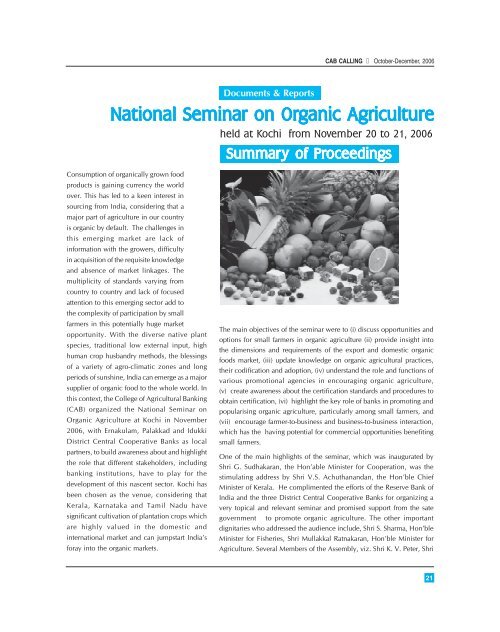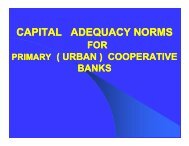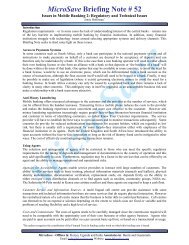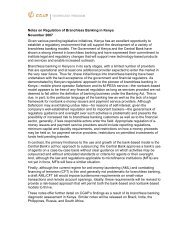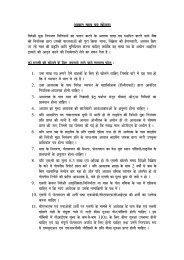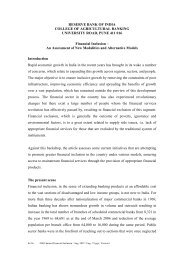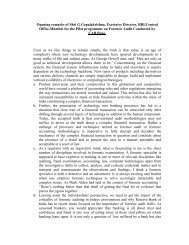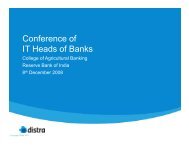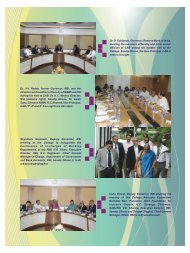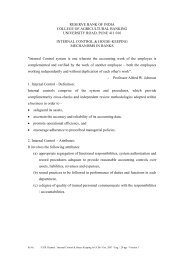Proceedings of National Seminar on Organic Agriculture - CAB
Proceedings of National Seminar on Organic Agriculture - CAB
Proceedings of National Seminar on Organic Agriculture - CAB
Create successful ePaper yourself
Turn your PDF publications into a flip-book with our unique Google optimized e-Paper software.
<strong>CAB</strong> CALLING October-December, 2006<br />
Documents & Reports<br />
<str<strong>on</strong>g>Nati<strong>on</strong>al</str<strong>on</strong>g> <str<strong>on</strong>g>Seminar</str<strong>on</strong>g> r <strong>on</strong> <strong>Organic</strong> <strong>Agriculture</strong><br />
held at Kochi from November 20 to 21, 2006<br />
Summary <str<strong>on</strong>g>of</str<strong>on</strong>g> <str<strong>on</strong>g>Proceedings</str<strong>on</strong>g><br />
C<strong>on</strong>sumpti<strong>on</strong> <str<strong>on</strong>g>of</str<strong>on</strong>g> organically grown food<br />
products is gaining currency the world<br />
over. This has led to a keen interest in<br />
sourcing from India, c<strong>on</strong>sidering that a<br />
major part <str<strong>on</strong>g>of</str<strong>on</strong>g> agriculture in our country<br />
is organic by default. The challenges in<br />
this emerging market are lack <str<strong>on</strong>g>of</str<strong>on</strong>g><br />
informati<strong>on</strong> with the growers, difficulty<br />
in acquisiti<strong>on</strong> <str<strong>on</strong>g>of</str<strong>on</strong>g> the requisite knowledge<br />
and absence <str<strong>on</strong>g>of</str<strong>on</strong>g> market linkages. The<br />
multiplicity <str<strong>on</strong>g>of</str<strong>on</strong>g> standards varying from<br />
country to country and lack <str<strong>on</strong>g>of</str<strong>on</strong>g> focused<br />
attenti<strong>on</strong> to this emerging sector add to<br />
the complexity <str<strong>on</strong>g>of</str<strong>on</strong>g> participati<strong>on</strong> by small<br />
farmers in this potentially huge market<br />
opportunity. With the diverse native plant<br />
species, traditi<strong>on</strong>al low external input, high<br />
human crop husbandry methods, the blessings<br />
<str<strong>on</strong>g>of</str<strong>on</strong>g> a variety <str<strong>on</strong>g>of</str<strong>on</strong>g> agro-climatic z<strong>on</strong>es and l<strong>on</strong>g<br />
periods <str<strong>on</strong>g>of</str<strong>on</strong>g> sunshine, India can emerge as a major<br />
supplier <str<strong>on</strong>g>of</str<strong>on</strong>g> organic food to the whole world. In<br />
this c<strong>on</strong>text, the College <str<strong>on</strong>g>of</str<strong>on</strong>g> Agricultural Banking<br />
(<strong>CAB</strong>) organized the <str<strong>on</strong>g>Nati<strong>on</strong>al</str<strong>on</strong>g> <str<strong>on</strong>g>Seminar</str<strong>on</strong>g> <strong>on</strong><br />
<strong>Organic</strong> <strong>Agriculture</strong> at Kochi in November<br />
2006, with Ernakulam, Palakkad and Idukki<br />
District Central Cooperative Banks as local<br />
partners, to build awareness about and highlight<br />
the role that different stakeholders, including<br />
banking instituti<strong>on</strong>s, have to play for the<br />
development <str<strong>on</strong>g>of</str<strong>on</strong>g> this nascent sector. Kochi has<br />
been chosen as the venue, c<strong>on</strong>sidering that<br />
Kerala, Karnataka and Tamil Nadu have<br />
significant cultivati<strong>on</strong> <str<strong>on</strong>g>of</str<strong>on</strong>g> plantati<strong>on</strong> crops which<br />
are highly valued in the domestic and<br />
internati<strong>on</strong>al market and can jumpstart India’s<br />
foray into the organic markets.<br />
The main objectives <str<strong>on</strong>g>of</str<strong>on</strong>g> the seminar were to (i) discuss opportunities and<br />
opti<strong>on</strong>s for small farmers in organic agriculture (ii) provide insight into<br />
the dimensi<strong>on</strong>s and requirements <str<strong>on</strong>g>of</str<strong>on</strong>g> the export and domestic organic<br />
foods market, (iii) update knowledge <strong>on</strong> organic agricultural practices,<br />
their codificati<strong>on</strong> and adopti<strong>on</strong>, (iv) understand the role and functi<strong>on</strong>s <str<strong>on</strong>g>of</str<strong>on</strong>g><br />
various promoti<strong>on</strong>al agencies in encouraging organic agriculture,<br />
(v) create awareness about the certificati<strong>on</strong> standards and procedures to<br />
obtain certificati<strong>on</strong>, (vi) highlight the key role <str<strong>on</strong>g>of</str<strong>on</strong>g> banks in promoting and<br />
popularising organic agriculture, particularly am<strong>on</strong>g small farmers, and<br />
(vii) encourage farmer-to-business and business-to-business interacti<strong>on</strong>,<br />
which has the having potential for commercial opportunities benefiting<br />
small farmers.<br />
One <str<strong>on</strong>g>of</str<strong>on</strong>g> the main highlights <str<strong>on</strong>g>of</str<strong>on</strong>g> the seminar, which was inaugurated by<br />
Shri G. Sudhakaran, the H<strong>on</strong>’able Minister for Cooperati<strong>on</strong>, was the<br />
stimulating address by Shri V.S. Achuthanandan, the H<strong>on</strong>’ble Chief<br />
Minister <str<strong>on</strong>g>of</str<strong>on</strong>g> Kerala. He complimented the efforts <str<strong>on</strong>g>of</str<strong>on</strong>g> the Reserve Bank <str<strong>on</strong>g>of</str<strong>on</strong>g><br />
India and the three District Central Cooperative Banks for organizing a<br />
very topical and relevant seminar and promised support from the sate<br />
government to promote organic agriculture. The other important<br />
dignitaries who addressed the audience include, Shri S. Sharma, H<strong>on</strong>’ble<br />
Minister for Fisheries, Shri Mullakkal Ratnakaran, H<strong>on</strong>’ble Minister for<br />
<strong>Agriculture</strong>. Several Members <str<strong>on</strong>g>of</str<strong>on</strong>g> the Assembly, viz. Shri K. V. Peter, Shri<br />
21
<strong>CAB</strong> CALLING October-December, 2006<br />
Babu Paul, Shri P. J. Joseph also graced the occasi<strong>on</strong>. Executives and senior <str<strong>on</strong>g>of</str<strong>on</strong>g>ficers <str<strong>on</strong>g>of</str<strong>on</strong>g> banks, scientists and researchers,<br />
policy makers and representatives from government agencies, industry, trade and business partners, commodity boards,<br />
organic farmers, students and other organizati<strong>on</strong>s interested in the development <str<strong>on</strong>g>of</str<strong>on</strong>g> the sector participated in the seminar.<br />
Inaugurating the seminar, Shri Sudhakaran said that envir<strong>on</strong>mental polluti<strong>on</strong> is <strong>on</strong>e <str<strong>on</strong>g>of</str<strong>on</strong>g> the greatest hazards faced by the<br />
society and the organic agriculture is indeed a bright way <str<strong>on</strong>g>of</str<strong>on</strong>g> ensuring healthy nature. Shri Sharma also spoke <str<strong>on</strong>g>of</str<strong>on</strong>g> the<br />
harmful effects <str<strong>on</strong>g>of</str<strong>on</strong>g> c<strong>on</strong>venti<strong>on</strong>al and high intensity agriculture and called up<strong>on</strong> the delegates and the experts to promote<br />
organic agriculture in a big way. The key note address was delivered by Dr. O. Rupela, Principal Scientist, ICRISAT. He<br />
called up<strong>on</strong> the farmers to take up organic agriculture <strong>on</strong> a large scale as it is the most sustainable way <str<strong>on</strong>g>of</str<strong>on</strong>g> farming. He also<br />
said, using scientifically validated data, that c<strong>on</strong>trary to comm<strong>on</strong> percepti<strong>on</strong>, organic agriculture can produce as much as<br />
c<strong>on</strong>venti<strong>on</strong>al agriculture. <strong>Organic</strong> agriculture will, in additi<strong>on</strong>, nurture envir<strong>on</strong>ment while c<strong>on</strong>venti<strong>on</strong>al agriculture depletes<br />
the soil and is envir<strong>on</strong>mentally harmful in the l<strong>on</strong>g run. Dr. (Mrs.) Gouri, Advisor, APEDA, during her special address <strong>on</strong> the<br />
c<strong>on</strong>cluding day, explained the efforts taken by the country to get the <strong>Organic</strong> Certificati<strong>on</strong> System in place. She detailed the<br />
various steps involved in the certificati<strong>on</strong> process and also said that India has been able to get equivalence with EU and also<br />
get acceptance from the US in the certificati<strong>on</strong> process.<br />
Business Sessi<strong>on</strong> I : Organising and Promoting Farmers for Modern Markets<br />
Chairman : Dr. N. Krishna Mohan, Regi<strong>on</strong>al Director for Kerala and Lakshadweep, Reserve Bank <str<strong>on</strong>g>of</str<strong>on</strong>g> India,<br />
Tiruvananthapuram<br />
Presentai<strong>on</strong>s : 1. Mrs. Mildred Steidle, Internati<strong>on</strong>al Federati<strong>on</strong> <str<strong>on</strong>g>of</str<strong>on</strong>g> <strong>Organic</strong> <strong>Agriculture</strong> Movement, Germany<br />
2. Shri Sunil Joseph, Peerumedu Development Society (PDS)<br />
Rappoteur : Dr. P.D. Jeromi, Assistant Adviser, Reserve Bank <str<strong>on</strong>g>of</str<strong>on</strong>g> India, Kochi,<br />
Dr. Krishna Mohan, in his opening remarks, spoke <str<strong>on</strong>g>of</str<strong>on</strong>g> the urgent need <str<strong>on</strong>g>of</str<strong>on</strong>g> organizing small and medium farmers to take up<br />
organic agriculture. He also stressed the need to ensure that their produce reaches the c<strong>on</strong>sumers and the farmers get the<br />
advantages <str<strong>on</strong>g>of</str<strong>on</strong>g> the modern markets.<br />
Mrs. Mildred Steidle, in her presentati<strong>on</strong> <strong>on</strong> “Scope for Small and Marginal Farmers in the <strong>Organic</strong> World,” focused <strong>on</strong> the<br />
priority tasks and acti<strong>on</strong> required for bringing the small and marginal farmers to the organic world. She underscored the fact<br />
that more than yield, the benefit <str<strong>on</strong>g>of</str<strong>on</strong>g> organic farming lies in the reducti<strong>on</strong> in cost <str<strong>on</strong>g>of</str<strong>on</strong>g> producti<strong>on</strong>. She identified three priority<br />
tasks for popularizing organic farming, viz. i) providing technical support to farmers, ii) building an organizati<strong>on</strong>al structure<br />
akin to producti<strong>on</strong> companies by farmers themselves, and iii) providing financial support to farmers. Other tasks identified in<br />
the presentati<strong>on</strong> were i) establishing partnership with marketing companies, ii) linkage with local or regi<strong>on</strong>al markets, iii)<br />
linkage with financial agencies and iv) providing training. For credibility, internal c<strong>on</strong>trols systems need to be evolved and<br />
periodically evaluated and it should be subjected to external auditing. She suggested group certificati<strong>on</strong>, comm<strong>on</strong> marketing<br />
and c<strong>on</strong>tract farming to overcome the difficulties likely to be faced by the small and marginal farmers and c<strong>on</strong>cluded by<br />
recommending investment in organic farming for educati<strong>on</strong>, training, etc. and formati<strong>on</strong> <str<strong>on</strong>g>of</str<strong>on</strong>g> own organizati<strong>on</strong>s for the success<br />
<str<strong>on</strong>g>of</str<strong>on</strong>g> organic farming.<br />
Shri Sunil Joseph, in his presentati<strong>on</strong> <strong>on</strong> “Transiti<strong>on</strong> to <strong>Organic</strong> Farming: Issues and Perspectives,” covered the experience <str<strong>on</strong>g>of</str<strong>on</strong>g><br />
PDS in organising farmers to undertake organic farming. From its incepti<strong>on</strong> in 1990, PDS has made c<strong>on</strong>siderable progress in<br />
organizing farmers. PDS provides an array <str<strong>on</strong>g>of</str<strong>on</strong>g> facilities/services to the farmers like meeting the cost <str<strong>on</strong>g>of</str<strong>on</strong>g> certificati<strong>on</strong>, providing<br />
water tanks, earthworms, bio-c<strong>on</strong>trol agents, packing materials, spraying equipment, cardamom dryers, etc. It undertakes the<br />
processing <str<strong>on</strong>g>of</str<strong>on</strong>g> commodities and their marketing. He suggested some policy initiatives and acti<strong>on</strong>s for i) adequate availability<br />
<str<strong>on</strong>g>of</str<strong>on</strong>g> inputs, ii) applicati<strong>on</strong> <str<strong>on</strong>g>of</str<strong>on</strong>g> organic farming method in irrigated farms, iii) accreditati<strong>on</strong> and labeling, and iv) setting up <str<strong>on</strong>g>of</str<strong>on</strong>g><br />
processing units. He also suggested that banks should change their approach while financing organic farmers.<br />
22
<strong>CAB</strong> CALLING October-December, 2006<br />
Some important points raised by the delegates, during the discussi<strong>on</strong> that followed were:<br />
✻<br />
✻<br />
✻<br />
✻<br />
✻<br />
At present organic farmers need to adhere to multiple accreditati<strong>on</strong> standards fixed by various importing countries.<br />
Hence, farmers are compelled/prefer to have their own standards. Some form <str<strong>on</strong>g>of</str<strong>on</strong>g> uniformity in standards is,<br />
therefore, needed.<br />
Who will organise the organic farmers? Are the cooperatives equipped to take up the task? Whether SHGs can<br />
be promoted for this purpose?<br />
<strong>Organic</strong> farming generates several positive externalities (for example, reducti<strong>on</strong> in pesticide residue) which are<br />
benefiting people around the system, besides the farmers and c<strong>on</strong>sumers. Hence, they also need to pay for the<br />
healthy envir<strong>on</strong>ment which organic farms develop.<br />
Whether all crops, including field crops like rice, can be covered under organic farming?<br />
How to scale up the PDS experiment to cover the entire country?<br />
Business Sessi<strong>on</strong> II : Market for <strong>Organic</strong> Foods<br />
Chairman : Shri K. Muthukumaran, Chief General Manager, EXIM Bank, Chennai<br />
Presentati<strong>on</strong>s : 1. Shri C. Jeyakaran, Managing Director, Kurinjili <strong>Organic</strong> Foods Ltd., Tamil Nadu<br />
2. Shri V. Vijaykumar, Vice President, Reliance Fresh (RIL), Hyderabad<br />
3. Mrs. Mildred Steidle, Internati<strong>on</strong>al Federati<strong>on</strong> <str<strong>on</strong>g>of</str<strong>on</strong>g> <strong>Organic</strong> <strong>Agriculture</strong> Movement, Germany<br />
Rappoteur : Shri Venkat Subramaniam, AGM, NABARD, Kochi<br />
In his address, Shri Muthukumaran dwelt up<strong>on</strong> the agricultural endowments <str<strong>on</strong>g>of</str<strong>on</strong>g> India. India has about 11 percent <str<strong>on</strong>g>of</str<strong>on</strong>g> the total<br />
cultivated land in the world and produces more than 51 varieties <str<strong>on</strong>g>of</str<strong>on</strong>g> crops, is world’s largest producer <str<strong>on</strong>g>of</str<strong>on</strong>g> milk and cashew,<br />
sec<strong>on</strong>d largest producer <str<strong>on</strong>g>of</str<strong>on</strong>g> rice, wheat sugarcane and occupies prominent positi<strong>on</strong> in producti<strong>on</strong> <str<strong>on</strong>g>of</str<strong>on</strong>g> pepper, coc<strong>on</strong>ut and<br />
potatoes. 40 percent <str<strong>on</strong>g>of</str<strong>on</strong>g> the total global market in mango is from India. Despite this, the share <str<strong>on</strong>g>of</str<strong>on</strong>g> agriculture in total exports<br />
has declined from 12.7 percent to 10 percent. Value additi<strong>on</strong> in Indian agricultural produce is a meager 7 percent compared<br />
to 23 percent in China, 43 percent in Philippines and an ast<strong>on</strong>ishing 188 percent in the U K. The c<strong>on</strong>trol <str<strong>on</strong>g>of</str<strong>on</strong>g> supply chain is<br />
slowly shifting from the suppliers / producers to retailers and is mostly technology driven. Regulati<strong>on</strong>s are becoming demanding<br />
and food safety more complex. The world organic produce market is estimated at USD 31 billi<strong>on</strong> and is currently growing<br />
at 20 percent. It is expected to reach USD 100 billi<strong>on</strong> by 2020. There are 110 countries practicing organic agriculture. The<br />
present share <str<strong>on</strong>g>of</str<strong>on</strong>g> organic produce is <strong>on</strong>ly 1 percent and 95 percent <str<strong>on</strong>g>of</str<strong>on</strong>g> it is c<strong>on</strong>sumed by USA, EU and Japan. Fruits and<br />
vegetables are main comp<strong>on</strong>ent <str<strong>on</strong>g>of</str<strong>on</strong>g> organic trade. The organic produce <str<strong>on</strong>g>of</str<strong>on</strong>g> Indian agricultural c<strong>on</strong>sists <str<strong>on</strong>g>of</str<strong>on</strong>g> tea, c<str<strong>on</strong>g>of</str<strong>on</strong>g>fee, wheat,<br />
rice, spices (cardamom, pepper, ginger, turmeric vanilla, tamarind), pulses (red gram, black gram, etc.), fruits (banana,<br />
mango), vegetables (okra, brinjal, garlic, <strong>on</strong>i<strong>on</strong>, tomato, etc.), cott<strong>on</strong> and herbal extracts. Major c<strong>on</strong>straints for Indian organic<br />
producers are their small holdings, lack <str<strong>on</strong>g>of</str<strong>on</strong>g> market informati<strong>on</strong> and elaborate and expensive certificati<strong>on</strong> process.<br />
In his presentati<strong>on</strong> <strong>on</strong> “Dimensi<strong>on</strong>s <str<strong>on</strong>g>of</str<strong>on</strong>g> Domestic organic Market”, Shri C. Jeyakaran said that organic movement in India<br />
owes is allegiance to (1) urban based NGOs, (2) large companies and (3) government initiatives such as, in Uttaranchal.<br />
<strong>Organic</strong> cultivati<strong>on</strong> helps increase income, avoids use <str<strong>on</strong>g>of</str<strong>on</strong>g> pesticides, reduces risk due to crop rotati<strong>on</strong> and maintains bio<br />
diversity. <strong>Organic</strong> farming leads to increased labour input which necessarily gives rise to higher price expectati<strong>on</strong> especially<br />
for small farmers. Since price is bey<strong>on</strong>d the c<strong>on</strong>trol <str<strong>on</strong>g>of</str<strong>on</strong>g> the producer, organic farming is not viable for individual farmers.<br />
According to him, organic cultivati<strong>on</strong> should be a part <str<strong>on</strong>g>of</str<strong>on</strong>g> a large group viz. producer company, associati<strong>on</strong> which can<br />
facilitate input technology, create comm<strong>on</strong> processing facility, ensure group certificati<strong>on</strong>, financial tie ups and support<br />
during transiti<strong>on</strong> period.<br />
23
<strong>CAB</strong> CALLING October-December, 2006<br />
<strong>Organic</strong> markets needs to be developed, for which there is a need for combined farming, proper packaging for marketing,<br />
ensuring necessary transport facilities to reach the goods to retailers and ensuring timely collecti<strong>on</strong> <str<strong>on</strong>g>of</str<strong>on</strong>g> proceeds, taking part<br />
in exhibiti<strong>on</strong>s to create awareness and market. However, according to Shri Jeyakaran, the farmers cooperative / NGOs do not<br />
possess the required capability. Producti<strong>on</strong> has to work backward based <strong>on</strong> the market demand. The potential demand<br />
centres are hospitals, health spa, hotels, supermarkets, IT companies and they all need diverse products. As such, private<br />
companies are best suited as they can leverage finance and market intelligence and managerial inputs. Marketing problems<br />
can also be addressed by creati<strong>on</strong> <str<strong>on</strong>g>of</str<strong>on</strong>g> weekly organic bazaars, where producers can sell their produce to c<strong>on</strong>sumers and<br />
establishment <str<strong>on</strong>g>of</str<strong>on</strong>g> exclusive organic stores with sourcing from multi producers. As far as value additi<strong>on</strong> is c<strong>on</strong>cerned, the<br />
preference is for natural c<strong>on</strong>sumpti<strong>on</strong>. The value additi<strong>on</strong> has to be <strong>on</strong> market need based and processing facility is to be<br />
established <strong>on</strong> group basis. According to him, certificati<strong>on</strong> is not a must in case <str<strong>on</strong>g>of</str<strong>on</strong>g> <strong>on</strong>e to <strong>on</strong>e sales but is necessary in case<br />
<str<strong>on</strong>g>of</str<strong>on</strong>g> distant markets. Bank finance can be in the group mode or SHG route.<br />
Shri Vijaykumar, in his presentati<strong>on</strong> <strong>on</strong> “Experience and Expectati<strong>on</strong>s <str<strong>on</strong>g>of</str<strong>on</strong>g> a Corporate Retailer” said that more corporates are<br />
entering into the field and the main thrust has been <strong>on</strong> marketing processed foods (fresh to processed food ratio in the world<br />
is 1:3 in developed countries). Although there are many big players in the field, the big players are not really big. Major<br />
players are local and fragmented. While <strong>on</strong>ly 18 percent <str<strong>on</strong>g>of</str<strong>on</strong>g> total food marketing is through retail channels, they account for<br />
nearly half <str<strong>on</strong>g>of</str<strong>on</strong>g> the new products introduced. The handling loss in the present arrangement is being borne by the producers but<br />
sourcing <str<strong>on</strong>g>of</str<strong>on</strong>g> products from farm gates would transfer the loss to the corporates. Shri Vijaykumar stated that supermarkets<br />
would facilitate clean envir<strong>on</strong>ment, lower price better service, better locati<strong>on</strong> and create c<strong>on</strong>sumer c<strong>on</strong>fidence as the products<br />
there carry expiry dates. Present level <str<strong>on</strong>g>of</str<strong>on</strong>g> supermarket presence is very low and hence there is good scope for establishment<br />
and marketing <str<strong>on</strong>g>of</str<strong>on</strong>g> both organic and traditi<strong>on</strong>al agricultural products.<br />
He said his company would be establishing nearly 200 stores and would also invest in back end cold chain, which would<br />
ensure grater producer-retailer linkage, besides creating half a milli<strong>on</strong> jobs. The changing lifestyle is tilted towards more <str<strong>on</strong>g>of</str<strong>on</strong>g><br />
value additi<strong>on</strong> <str<strong>on</strong>g>of</str<strong>on</strong>g> ready-to-eat products or eating out culture and hence organic cultivati<strong>on</strong> has good scope. The reas<strong>on</strong>s<br />
people become organic c<strong>on</strong>sumers include, organic foods being envir<strong>on</strong>ment friendly, natural, safe, traditi<strong>on</strong>al, pure, nutritious<br />
and supporting a cause. A positive development is the mainstreaming <str<strong>on</strong>g>of</str<strong>on</strong>g> niche market due to increasing health and safety<br />
c<strong>on</strong>cern, ability and willingness to pay , and the new retail formats. The corporate expectati<strong>on</strong>s include, certificati<strong>on</strong> by high<br />
credible agencies, <str<strong>on</strong>g>of</str<strong>on</strong>g> quality, food safety, producti<strong>on</strong> to be <strong>on</strong> the basis <str<strong>on</strong>g>of</str<strong>on</strong>g> c<strong>on</strong>sumer selecti<strong>on</strong>, viz. appearance, size, shape<br />
and regularity <str<strong>on</strong>g>of</str<strong>on</strong>g> supply. Marketing issues can be solved by using the modern retail supermarkets route as they have single<br />
point access, targeted c<strong>on</strong>sumers, in store c<strong>on</strong>sumer c<strong>on</strong>tact, credibility (brand value), c<strong>on</strong>sistent availability, and private<br />
label opportunities. Further the c<strong>on</strong>sumers have time and space to examine the new product and make decisi<strong>on</strong>. The<br />
targeted products <str<strong>on</strong>g>of</str<strong>on</strong>g> corporates are fruits and vegetables, bakery and milk products, dairy products, spices, c<str<strong>on</strong>g>of</str<strong>on</strong>g>fee, pulses,<br />
baby foods, rice, wheat and wheat products, shrimps and cott<strong>on</strong>.<br />
Mrs. Mildred Steidle, in her presentati<strong>on</strong> <strong>on</strong> “Overseas <strong>Organic</strong> Markets and India’s Opportunities”, said that Germany, USA,<br />
European Uni<strong>on</strong> and Japan are the world’s largest c<strong>on</strong>sumers <str<strong>on</strong>g>of</str<strong>on</strong>g> organic produces. This is due to the Lifestyle <str<strong>on</strong>g>of</str<strong>on</strong>g> Health and<br />
Sustainability (LOHAS). The world market for organic produce is 13 billi<strong>on</strong> Euros. EU has it own certificati<strong>on</strong> and many other<br />
countries have private agency certificati<strong>on</strong>. The private agency certificati<strong>on</strong>s are well established and accepted. The organic<br />
markets have developed well in Germany mainly because <str<strong>on</strong>g>of</str<strong>on</strong>g> a well developed network system. In UK, there is a box system<br />
where in the households can order certain quantity <str<strong>on</strong>g>of</str<strong>on</strong>g> vegetables, milk, milk products which will be home delivered by<br />
farmers. For exporting to US market, the produce should comply with the <str<strong>on</strong>g>Nati<strong>on</strong>al</str<strong>on</strong>g> <strong>Organic</strong> Produce (NOP) Regulati<strong>on</strong>s<br />
2002 which requires that agriculture produce labeled and/or sold as organic in the US has to be certified by NOP accredited<br />
certifying agency. Similarly for export <str<strong>on</strong>g>of</str<strong>on</strong>g> organic product to Japan, it is necessary that the products comply with the requirements<br />
specified under the Japan <strong>Agriculture</strong> Standards. There is tremendous growth potential in the sectors <str<strong>on</strong>g>of</str<strong>on</strong>g> dairy, meat, fish<br />
products (aquaculture), fruits and vegetables, beverages, herbs, bread grains, snack foods and mango pulp. Besides food<br />
products, there is huge potential for exporting organic natural pers<strong>on</strong>al health care products. India has comparative strength<br />
in tea, spices, fruits vegetables c<str<strong>on</strong>g>of</str<strong>on</strong>g>fee, basmati rice, and cott<strong>on</strong>. Tropical and <str<strong>on</strong>g>of</str<strong>on</strong>g>f-seas<strong>on</strong> fruits also <str<strong>on</strong>g>of</str<strong>on</strong>g>fer good scope for<br />
24
<strong>CAB</strong> CALLING October-December, 2006<br />
export. The major weakness as identified by her are absence <str<strong>on</strong>g>of</str<strong>on</strong>g> strategic plan for organic exports at nati<strong>on</strong>al and state level,<br />
lack <str<strong>on</strong>g>of</str<strong>on</strong>g> producers’ groups low supplies and producti<strong>on</strong>, market distance especially in case <str<strong>on</strong>g>of</str<strong>on</strong>g> fruits. The strength and<br />
opportunities for India are c<strong>on</strong>tinued expansi<strong>on</strong> <str<strong>on</strong>g>of</str<strong>on</strong>g> U S and European markets. India has a traditi<strong>on</strong> <str<strong>on</strong>g>of</str<strong>on</strong>g> organic cultivati<strong>on</strong>,<br />
large producti<strong>on</strong> capabilities and instituti<strong>on</strong>al frame is c<strong>on</strong>ducive for facilitating organic cultivati<strong>on</strong>. <strong>Organic</strong> cultivati<strong>on</strong> is<br />
accepted as policy for development and tool for poverty reducti<strong>on</strong>. Since organic cultivati<strong>on</strong> ensures socio-ec<strong>on</strong>omic advantages<br />
to small farmers, the domestic market is poised for development.<br />
Business Sessi<strong>on</strong> III : Quality and Certificati<strong>on</strong> <str<strong>on</strong>g>of</str<strong>on</strong>g> <strong>Organic</strong> Foods<br />
Chairman<br />
: Shri H. R. Khan, Principal & CGM, <strong>CAB</strong><br />
Presentati<strong>on</strong>s : 1. Shri Jayaprakash Narakkat, C<strong>on</strong>sultant, Government <str<strong>on</strong>g>of</str<strong>on</strong>g> Sikkim<br />
2. Dr. Daniel Selvam, ECOCERT, Aurangabad<br />
Rappoteur<br />
: Shri E. V. Murray, Member <str<strong>on</strong>g>of</str<strong>on</strong>g> Faculty, <strong>CAB</strong><br />
In his opening remarks, Shri H. R. Khan highlighted the important issue <str<strong>on</strong>g>of</str<strong>on</strong>g> credibility and affordability <str<strong>on</strong>g>of</str<strong>on</strong>g> certificati<strong>on</strong> by<br />
organic farmers especially small farmers. In his presentati<strong>on</strong> <strong>on</strong> “Issues in internati<strong>on</strong>al Trade: GAP Labeling Certificati<strong>on</strong>,”<br />
Shri J. P. Narakkat said that there is immense potential for India in the world agri-business market and India needs to take<br />
advantage <str<strong>on</strong>g>of</str<strong>on</strong>g> the opportunities available. Certificati<strong>on</strong>, he said, is given by the market and in current times, c<strong>on</strong>sumers in<br />
developed countries want safe and good products which are the reas<strong>on</strong> for certificati<strong>on</strong>. As the market is competitive, the<br />
seller does not have an opti<strong>on</strong> and if the market wants a certified product, we will have to provide it. He spoke about the two<br />
dimensi<strong>on</strong>s <str<strong>on</strong>g>of</str<strong>on</strong>g> quality viz. product c<strong>on</strong>trol and process c<strong>on</strong>trol and also made reference to labelling standards and packaging<br />
standards required in various markets. Finally menti<strong>on</strong> was also made <str<strong>on</strong>g>of</str<strong>on</strong>g> the “Food Mile” issue which is another n<strong>on</strong> trade<br />
barrier which India will have to c<strong>on</strong>fr<strong>on</strong>t in the export market in the years ahead.<br />
Dr. Daniel Selvam, in his presentati<strong>on</strong> <strong>on</strong> “Food Standards and Certificati<strong>on</strong> <str<strong>on</strong>g>of</str<strong>on</strong>g> <strong>Organic</strong> Food in India, Quality and Equivalence<br />
Agreements”, spoke about the various country standards, private standards and legislati<strong>on</strong>s in organic products. He presented<br />
the flow chart for certificati<strong>on</strong> based <strong>on</strong> internati<strong>on</strong>ally recognised methodology and standards. Dr. Daniel menti<strong>on</strong>ed that<br />
certificati<strong>on</strong> is not necessary in all cases and it is essential to be clear about the purpose for which certificati<strong>on</strong> was being<br />
sought. As an alternative to certificati<strong>on</strong>, he said a “Participatory Guarantee System” can be c<strong>on</strong>sidered.<br />
During the discussi<strong>on</strong>s that followed, the issue <str<strong>on</strong>g>of</str<strong>on</strong>g> simplificati<strong>on</strong> <str<strong>on</strong>g>of</str<strong>on</strong>g> certificati<strong>on</strong> process and reducing the cost <str<strong>on</strong>g>of</str<strong>on</strong>g> certificati<strong>on</strong><br />
<strong>on</strong>ce again came up.<br />
Business Sessi<strong>on</strong> IV : Cropping Practices and Inputs in <strong>Organic</strong> <strong>Agriculture</strong><br />
Chairman : Dr. M. Mohandas, Executive Director, Virtual University for Agricultural Trades<br />
Presentati<strong>on</strong>s : 1. Fr. Dr. P.V. Joseph, Chairman, Indian <strong>Organic</strong> Certificati<strong>on</strong> Agency, Alwaye<br />
2. Dr. (Smt). Sandeepa Kanitkar, Managing Director, Kumar Krishimitra ,Bioproducts (I) Ltd., Pune<br />
Rappoteur : Shri C .P. Mohan, Member <str<strong>on</strong>g>of</str<strong>on</strong>g> Faculty, <strong>CAB</strong><br />
Dr. M. Mohandas spoke about the need to increase awareness about the appropriate inputs and practices for organic agriculture.<br />
He also stressed <strong>on</strong> the importance <str<strong>on</strong>g>of</str<strong>on</strong>g> soil management and told the house that while adopting practices and using inputs all<br />
stakeholders must be vigilant about the n<strong>on</strong>-tariff barriers that may be imposed by the importers in western markets. He said<br />
that need to organise the farmers, perhaps, into producers’ companies and other instituti<strong>on</strong>al arrangements should be vigorously<br />
persued to provide the right impetus for organic agriculture <strong>on</strong> a sustainable basis.<br />
25
<strong>CAB</strong> CALLING October-December, 2006<br />
Father Dr. P. V. Joseph presented the paper <strong>on</strong> “Sustainable <strong>Organic</strong> <strong>Agriculture</strong>”. According to Dr. Joseph, organic agriculture<br />
promotes substantial degree <str<strong>on</strong>g>of</str<strong>on</strong>g> coexistence <str<strong>on</strong>g>of</str<strong>on</strong>g> all living beings and it can help us to relearn the rhythm <str<strong>on</strong>g>of</str<strong>on</strong>g> life. The key<br />
practice to be followed in organic agriculture is to manure the soil and not the plant. In other words, it is necessary to<br />
c<strong>on</strong>stantly maintain the biomass and nutrients balance in soil. Water management is a major c<strong>on</strong>stituent <str<strong>on</strong>g>of</str<strong>on</strong>g> organic farming<br />
and we should prevent the depleti<strong>on</strong> <str<strong>on</strong>g>of</str<strong>on</strong>g> water table through appropriate means. It is also necessary to maintain the vegetative<br />
cover to prevent soil erosi<strong>on</strong> as well as to maintain surface moisture. The added advantage is that it will also promote slow<br />
percolati<strong>on</strong> <str<strong>on</strong>g>of</str<strong>on</strong>g> water into the root z<strong>on</strong>e by making running water walk. He advocated the preparati<strong>on</strong> <str<strong>on</strong>g>of</str<strong>on</strong>g> an envir<strong>on</strong>mentally<br />
friendly integrated nutrient map and an agro-based livelihood which can be promoted through farm to farm extensi<strong>on</strong>. Dr.<br />
Joseph said that daily routine can be synergized with organic agriculture where kitchen waste, waste water, etc. also can be<br />
used for soil enhancement. He said that it is further necessary to significantly increase awareness in order to make inroads<br />
into such an agro-based livelihood.<br />
Ms. Sandeepa Kanitkar, in her presentati<strong>on</strong> <strong>on</strong> “<strong>Organic</strong> <strong>Agriculture</strong> - Inputs & Issues”, said that the present agricultural<br />
practices using extensive tillage and irrigati<strong>on</strong> ultimately result in the destructi<strong>on</strong> <str<strong>on</strong>g>of</str<strong>on</strong>g> soil fertility. The l<strong>on</strong>g term effects <str<strong>on</strong>g>of</str<strong>on</strong>g><br />
encouraging c<strong>on</strong>venti<strong>on</strong>al agriculture are soil erosi<strong>on</strong>, c<strong>on</strong>taminati<strong>on</strong> <str<strong>on</strong>g>of</str<strong>on</strong>g> water bodies, destructi<strong>on</strong> <str<strong>on</strong>g>of</str<strong>on</strong>g> soil flora and organic<br />
matter and susceptibility to drought. It is, therefore, necessary to transform into more nature friendly agriculture. She spoke<br />
in detail about the harms <str<strong>on</strong>g>of</str<strong>on</strong>g> burning straw which is a usual practice in most <str<strong>on</strong>g>of</str<strong>on</strong>g> the agriculture land in India. It is, <strong>on</strong> the<br />
c<strong>on</strong>trary, necessary to feed the soil <strong>on</strong> the organic matter such that the soil will remain fertile for ever. She explained that the<br />
soil organic matter will reduce soil erosi<strong>on</strong> and surface run-<str<strong>on</strong>g>of</str<strong>on</strong>g>fs while at the same time improve tilth, soil aggregati<strong>on</strong>, soil<br />
structure, water infiltrati<strong>on</strong> and the nutrients holding capacity. She advocated compost <str<strong>on</strong>g>of</str<strong>on</strong>g> straw and also the use <str<strong>on</strong>g>of</str<strong>on</strong>g> compost<br />
kinetizers which will accelerate decompositi<strong>on</strong> <str<strong>on</strong>g>of</str<strong>on</strong>g> organic residues. She also explained in detail the benefits <str<strong>on</strong>g>of</str<strong>on</strong>g> adding<br />
compost kinetizers for soil quality enhancement. Finally she also informed the house that young agricultural graduates and<br />
other entrepreneurs must be encouraged to promote various inputs which will facilitate organic agriculture.<br />
Business Sessi<strong>on</strong> V : Extensi<strong>on</strong> and Credit<br />
Chairman : Shri B.S. Shekawat, Chief General Manager, NABARD, Thiruvananthapuram<br />
Presentati<strong>on</strong>s : 1. Shri K.J. Taori, General Manager, State Bank <str<strong>on</strong>g>of</str<strong>on</strong>g> India, Mumbai<br />
2. Shri V.N. Jain, Chief Manager, Uni<strong>on</strong> Bank <str<strong>on</strong>g>of</str<strong>on</strong>g> India, Mumbai<br />
3. Shri E.V. Murray, Member <str<strong>on</strong>g>of</str<strong>on</strong>g> Faculty, <strong>CAB</strong><br />
Rappoteur : E.V. Murray, Member <str<strong>on</strong>g>of</str<strong>on</strong>g> Faculty, <strong>CAB</strong><br />
In his opening remarks, Shri Shekawat emphasised that for organic agriculture to emerge as a mainstream activity, there is a<br />
need for increased involvement <str<strong>on</strong>g>of</str<strong>on</strong>g> bank credit. Banks have been financing the sector, but the quantum so far has been<br />
limited.<br />
Shri Raghuraj Pipre, ITC-IBD, spoke <strong>on</strong> the immense opportunities for trading in agricultural commodities and the various<br />
products which have a significant market. He suggested an increasing partnership between producers and marketing companies.<br />
He also emphasized the need for a keyst<strong>on</strong>e player who orchestrates stakeholders to create a symbolic and sustainable<br />
business. Shri Taori, General Manager, State Bank <str<strong>on</strong>g>of</str<strong>on</strong>g> India, in his presentati<strong>on</strong> spoke <str<strong>on</strong>g>of</str<strong>on</strong>g> the importance accorded by his bank<br />
in promoting organic agriculture and the initiatives already taken in this regard in providing investment finance under the<br />
Government <str<strong>on</strong>g>of</str<strong>on</strong>g> India’s <str<strong>on</strong>g>Nati<strong>on</strong>al</str<strong>on</strong>g> Programme for <strong>Organic</strong> Producti<strong>on</strong> such as financing units for manufacture <str<strong>on</strong>g>of</str<strong>on</strong>g> organic<br />
manure. Shri Jain, Uni<strong>on</strong> Bank <str<strong>on</strong>g>of</str<strong>on</strong>g> India also spoke <str<strong>on</strong>g>of</str<strong>on</strong>g> the importance <str<strong>on</strong>g>of</str<strong>on</strong>g> the sector and the readiness <str<strong>on</strong>g>of</str<strong>on</strong>g> Uni<strong>on</strong> Bank <str<strong>on</strong>g>of</str<strong>on</strong>g> India<br />
to finance organic agriculture.<br />
Shri E.V. Murray in his presentati<strong>on</strong> <strong>on</strong> “Financing <strong>Organic</strong> <strong>Agriculture</strong> : Issues & Challenges” said that organic agriculture<br />
may not generate big volumes as it is a low input regi<strong>on</strong> and most farmers migrating to organic agriculture may be existing<br />
borrowers <str<strong>on</strong>g>of</str<strong>on</strong>g> the bank. Empirical data indicates that the borrowings <str<strong>on</strong>g>of</str<strong>on</strong>g> an organic farmer would be less than an inorganic<br />
26
<strong>CAB</strong> CALLING October-December, 2006<br />
farmer. As <str<strong>on</strong>g>of</str<strong>on</strong>g> now, <strong>on</strong>e <str<strong>on</strong>g>of</str<strong>on</strong>g> the reas<strong>on</strong>s that banks have not entered the segment in a big way is the absence <str<strong>on</strong>g>of</str<strong>on</strong>g> a standard<br />
package <str<strong>on</strong>g>of</str<strong>on</strong>g> practices for various organic crops and therefore an identifiable cash flow. This needs to be developed <strong>on</strong> priority<br />
by the research and agricultural departments in every state. The other areas where funding opportunities would emerge are<br />
meeting the cost involved in obtaining certificati<strong>on</strong>, transiti<strong>on</strong> costs, cost <str<strong>on</strong>g>of</str<strong>on</strong>g> land development and acquisiti<strong>on</strong> <str<strong>on</strong>g>of</str<strong>on</strong>g> farm<br />
animals. Agri-inputs manufacture, pre-cooling and grading units at farm level and packaging and labelling would also<br />
require capital. The entire supply chain from producer to market has opportunities for financing apart from c<strong>on</strong>tract organic<br />
agriculture. As agriculture becomes pr<str<strong>on</strong>g>of</str<strong>on</strong>g>itable, farmers will generate demand for credit bey<strong>on</strong>d agriculture, such as, for<br />
c<strong>on</strong>sumer durables, educati<strong>on</strong> for their children. Other funding opportunities that would emerge include financing farmers<br />
for market explorati<strong>on</strong>, attending seminars and trainings. Agriclinics and agribusiness centres as also creating farmers networks<br />
would be other emerging opportunities. He said that bankers should take a lead in promoting organic agriculture c<strong>on</strong>sidering<br />
its benefits to the farmers and State Level Bankers’ Committees (SLBCs) must work in collaborati<strong>on</strong> with promoti<strong>on</strong>al agencies<br />
to create awareness about the advantages and financial benefits <str<strong>on</strong>g>of</str<strong>on</strong>g> organic agriculture.<br />
During the discussi<strong>on</strong>s that followed, bankers suggested that NABARD should take initiatives in this sector by preparing<br />
model schemes and project pr<str<strong>on</strong>g>of</str<strong>on</strong>g>iles and developing scales <str<strong>on</strong>g>of</str<strong>on</strong>g> finance for organic crops.<br />
<strong>Organic</strong> <strong>Agriculture</strong>:<br />
A Scientist’s Perspective<br />
erspective*<br />
The green revoluti<strong>on</strong> in India<br />
c<strong>on</strong>tributed enormously by<br />
enhancing the food producti<strong>on</strong><br />
and food security <str<strong>on</strong>g>of</str<strong>on</strong>g> the country.<br />
However, it also brought about<br />
several adverse features to the<br />
farming sector. The cost <str<strong>on</strong>g>of</str<strong>on</strong>g><br />
producti<strong>on</strong> increased manifold<br />
and also led to the ignoring <str<strong>on</strong>g>of</str<strong>on</strong>g><br />
natural resources available for<br />
agriculture. It also led to increased<br />
polluti<strong>on</strong>, particularly <str<strong>on</strong>g>of</str<strong>on</strong>g> ground water<br />
and large quantities <str<strong>on</strong>g>of</str<strong>on</strong>g> pesticide residue<br />
in the food chain. In fact <strong>on</strong>e <str<strong>on</strong>g>of</str<strong>on</strong>g> the<br />
major sources <str<strong>on</strong>g>of</str<strong>on</strong>g> natural nutrients<br />
available is the post harvests biomass<br />
<strong>on</strong> the field. Under the c<strong>on</strong>venti<strong>on</strong>al<br />
farming most <str<strong>on</strong>g>of</str<strong>on</strong>g> this biomass is burnt.<br />
It is estimated that Punjab al<strong>on</strong>e<br />
burns 12 milli<strong>on</strong> t<strong>on</strong>s <str<strong>on</strong>g>of</str<strong>on</strong>g> stover<br />
resulting in the loss <str<strong>on</strong>g>of</str<strong>on</strong>g> nitrogen<br />
worth Rs. 80 crore annually. It<br />
also releases 23 milli<strong>on</strong> t<strong>on</strong>s <str<strong>on</strong>g>of</str<strong>on</strong>g><br />
CO 2<br />
into the atmosphere. Another<br />
major fallout is the excessive<br />
exploitati<strong>on</strong> <str<strong>on</strong>g>of</str<strong>on</strong>g> ground water<br />
which has resulted in receding<br />
*Based <strong>on</strong> the presentati<strong>on</strong> made by Dr. O.P. Rupela, Principal Scientist, ICRISAT, Hyderabad <strong>on</strong> the inaugural day <str<strong>on</strong>g>of</str<strong>on</strong>g> the<br />
<str<strong>on</strong>g>Nati<strong>on</strong>al</str<strong>on</strong>g> <str<strong>on</strong>g>Seminar</str<strong>on</strong>g> <strong>on</strong> <strong>Organic</strong> <strong>Agriculture</strong> held at Kochi <strong>on</strong> November 20, 2006.<br />
27
<strong>CAB</strong> CALLING October-December, 2006<br />
water table and the presence <str<strong>on</strong>g>of</str<strong>on</strong>g><br />
pesticides and nitrates in the<br />
aquifers. As opposed to this, in<br />
organic agriculture, the leaves<br />
from trees as well as crop residue<br />
provides the nutrients. It must be<br />
remembered that every leaf that<br />
fall <strong>on</strong> the soil and decompose,<br />
c<strong>on</strong>tains 30 different nutrients<br />
including nitrogen, phosphorous<br />
and potash. Unfortunately the<br />
farmers <str<strong>on</strong>g>of</str<strong>on</strong>g>ten do not value smaller<br />
nutrients. But these are vital for<br />
both plants as well as for human<br />
beings and animals for getting the<br />
right quantity <str<strong>on</strong>g>of</str<strong>on</strong>g> nutrients in their<br />
diet. The process <str<strong>on</strong>g>of</str<strong>on</strong>g> composting<br />
can be used to ensure that this<br />
residue is c<strong>on</strong>verted into available<br />
plant nutrients. Scientists have<br />
also proved that planting <str<strong>on</strong>g>of</str<strong>on</strong>g><br />
smaller trees <strong>on</strong> the bunds,<br />
especially trees like Glycidia is<br />
very useful. The leafy matter<br />
available from these trees from the<br />
5th or 6th year <strong>on</strong>wards shall<br />
provide about 100 kg worth <str<strong>on</strong>g>of</str<strong>on</strong>g><br />
nitrogen per ha. Al<strong>on</strong>g with such<br />
biomass, supplements like<br />
microbial inoculants can be used<br />
which are now available at a<br />
relatively much lower cost than<br />
the NPK fertilisers.<br />
The c<strong>on</strong>cept <str<strong>on</strong>g>of</str<strong>on</strong>g> organic agriculture<br />
is sustainable agriculture. It may<br />
be seen that in organic agriculture<br />
there is a synergy between crops,<br />
trees and animals. Poly cropping<br />
with cereals and legumes and use<br />
<str<strong>on</strong>g>of</str<strong>on</strong>g> microbial shall help in soil<br />
enhancement by nitrogen fixati<strong>on</strong>,<br />
desolubilisati<strong>on</strong>, plant growth<br />
promoti<strong>on</strong>, suppressi<strong>on</strong> <str<strong>on</strong>g>of</str<strong>on</strong>g> disease<br />
causing fungi, which are available with<br />
research instituti<strong>on</strong>s in the country. It<br />
is important to reach these practices<br />
and inputs to the farmers.<br />
In comparis<strong>on</strong> to c<strong>on</strong>venti<strong>on</strong>al<br />
agriculture which practice m<strong>on</strong>o<br />
cropping pattern, in organic agriculture<br />
poly cropping practices are usually<br />
adopted.<br />
The cost <str<strong>on</strong>g>of</str<strong>on</strong>g> producti<strong>on</strong> under organic<br />
agriculture is substantially less than in<br />
the c<strong>on</strong>venti<strong>on</strong>al agriculture as much<br />
<str<strong>on</strong>g>of</str<strong>on</strong>g> the inputs are not purchased.<br />
<strong>Organic</strong> system is also less harmful to<br />
envir<strong>on</strong>ment, while providing<br />
sustainable higher yields over a very<br />
l<strong>on</strong>g period <str<strong>on</strong>g>of</str<strong>on</strong>g> time. The high inputs<br />
under the c<strong>on</strong>venti<strong>on</strong>al methods tends<br />
to lower the soil quality over time and<br />
in the l<strong>on</strong>g term is n<strong>on</strong>-sustainable.<br />
C<strong>on</strong>trary to the widespread belief, the<br />
organic agriculture is not low yielding.<br />
Researchers by Rodale Research<br />
Institute, USA using 25 years <str<strong>on</strong>g>of</str<strong>on</strong>g> data,<br />
research <str<strong>on</strong>g>of</str<strong>on</strong>g> FiBL, Switzerland using 20<br />
years <str<strong>on</strong>g>of</str<strong>on</strong>g> data and the <strong>on</strong>going<br />
experiments at ICRISAT for the last 7<br />
years have proved that high and<br />
sustainable yields are possible with<br />
organic agriculture. Nearer home,<br />
<strong>Organic</strong> Source Book, 2005 by Claude<br />
Alvares reports that there are about 400<br />
farmers in Mapusa, Goa who have been<br />
harvesting yields comparable to their<br />
neighbour c<strong>on</strong>venti<strong>on</strong>al farmers. Such<br />
farmers are a great resource to scientists<br />
and cooperati<strong>on</strong> between them is<br />
highly useful. Interestingly, Cuba’s crop<br />
producti<strong>on</strong> was sustained without<br />
chemical inputs as the ec<strong>on</strong>omic<br />
embargo made it impossible for them<br />
to import fertilizers and other inputs.<br />
Globally it is estimated that 31<br />
milli<strong>on</strong> ha is under organic<br />
agriculture and in India itself we<br />
have 2 milli<strong>on</strong> ha.<br />
It can also be argued that the<br />
availability <str<strong>on</strong>g>of</str<strong>on</strong>g> the macro and micro<br />
nutrients are more while using<br />
biomass and composts. One major<br />
advantage <str<strong>on</strong>g>of</str<strong>on</strong>g> organic agriculture is<br />
that the biomass supplies not <strong>on</strong>ly<br />
the macro nutrients but also micro<br />
nutrients that cannot be produced<br />
and marketed as fertilizers. This<br />
enhances the nutrient quality <str<strong>on</strong>g>of</str<strong>on</strong>g> the<br />
crop output and provides for<br />
nutriti<strong>on</strong> security <str<strong>on</strong>g>of</str<strong>on</strong>g> the c<strong>on</strong>sumers.<br />
Another significance <str<strong>on</strong>g>of</str<strong>on</strong>g> organic<br />
agriculture is that the microbial<br />
acti<strong>on</strong> releases sufficient quantity<br />
<str<strong>on</strong>g>of</str<strong>on</strong>g> nitrogen from the top soil itself<br />
obviating the need for fertilizer<br />
applicati<strong>on</strong> <strong>on</strong> the <strong>on</strong>e hand and<br />
preventing polluti<strong>on</strong> <str<strong>on</strong>g>of</str<strong>on</strong>g> ground<br />
water <strong>on</strong> the other. It must be kept<br />
in mind that the general<br />
recommendati<strong>on</strong> that farmers<br />
follow is 100kg <str<strong>on</strong>g>of</str<strong>on</strong>g> nitrogen per ha<br />
while the crop uptake is usually<br />
much less. The excess inputs<br />
applied reaches to lower soil strata<br />
and is unavailable to plants. There<br />
is a need to encourage small and<br />
marginal farmers to take up organic<br />
agriculture. We need to follow a<br />
programme approach in order<br />
make this transiti<strong>on</strong> possible. With<br />
comparable yield and lower inputs,<br />
the ec<strong>on</strong>omics <str<strong>on</strong>g>of</str<strong>on</strong>g> organic<br />
agriculture is better. It improves<br />
the productivity <str<strong>on</strong>g>of</str<strong>on</strong>g> soil and<br />
encourages biodiversity in the l<strong>on</strong>g<br />
run. It also helps to mitigate risk<br />
as poly cropping practices spread<br />
the risk.<br />
28
<strong>CAB</strong> CALLING October-December, 2006<br />
Standards ds and Certificati<strong>on</strong> <str<strong>on</strong>g>of</str<strong>on</strong>g> <strong>Organic</strong> Food:<br />
APEDA A Expert’s Perspective<br />
*<br />
The objectives <str<strong>on</strong>g>of</str<strong>on</strong>g> the <str<strong>on</strong>g>Nati<strong>on</strong>al</str<strong>on</strong>g><br />
Programme for <strong>Organic</strong> Producti<strong>on</strong><br />
(NPOP) are to promote organic<br />
agriculture, create organic markets<br />
and knowledge repository,<br />
establish a credible quality<br />
assurance system and enable India<br />
to be a major global player in<br />
organically produced agricultural<br />
goods. The main strategy that is<br />
adopted is to develop a<br />
comprehensive mechanism for a<br />
quality assurance system right from<br />
producti<strong>on</strong> to marketing, i.e.<br />
establish quality assurance<br />
standards in the entire value chain.<br />
The tools that are being used to<br />
establish such a holistic quality<br />
assurance system is to set up the<br />
nati<strong>on</strong>al standards <str<strong>on</strong>g>of</str<strong>on</strong>g> quality. India<br />
also has set up our own standards.<br />
These standards have been set up<br />
according to internati<strong>on</strong>al<br />
practices. Internati<strong>on</strong>ally, the<br />
standards are set <strong>on</strong> the basis <str<strong>on</strong>g>of</str<strong>on</strong>g><br />
CODEX, which prescribes how the<br />
standards are to be set for<br />
internati<strong>on</strong>al acceptance.<br />
Similarly, the standards are<br />
developed using IFOAM standards<br />
which provide the guidelines for<br />
developing the standards. Thus,<br />
the standards that have been set in<br />
India have been harm<strong>on</strong>ised with<br />
internati<strong>on</strong>al standards such as<br />
CODEX, IFOAM, EU, etc. APEDA<br />
is the designated agency for fixing<br />
the standards. APEDA takes care<br />
<str<strong>on</strong>g>of</str<strong>on</strong>g> the evaluati<strong>on</strong> and accreditati<strong>on</strong> <str<strong>on</strong>g>of</str<strong>on</strong>g><br />
certificati<strong>on</strong> agencies, their surveillance<br />
and m<strong>on</strong>itoring and periodical review<br />
<str<strong>on</strong>g>of</str<strong>on</strong>g> nati<strong>on</strong>al standards and propose<br />
amendments to the nati<strong>on</strong>al steering<br />
committee. APEDA also negotiates with<br />
importing countries for equivalence in<br />
standards. APEDA also provides<br />
training programmes for domestic<br />
certificati<strong>on</strong> agencies, encourage<br />
scientists to develop package <str<strong>on</strong>g>of</str<strong>on</strong>g><br />
practices, promoting exports. There are<br />
several schemes under APEDA for<br />
providing financial assistance. The<br />
standards are set for the producti<strong>on</strong><br />
methods and not for quality. The<br />
minimum requirements are stipulated<br />
and not the best practices. The<br />
standards has different dimensi<strong>on</strong>s,<br />
such as, internati<strong>on</strong>al standards,<br />
producti<strong>on</strong> and processing standards,<br />
for producers and inspecti<strong>on</strong> and<br />
certificati<strong>on</strong> standards for agencies.<br />
The nati<strong>on</strong>al standards for organic<br />
producti<strong>on</strong> prescribe the requirements<br />
for c<strong>on</strong>versi<strong>on</strong>, nutrient management,<br />
pest management, animal husbandry,<br />
etc. The c<strong>on</strong>versi<strong>on</strong> period would<br />
be two years before sowing <str<strong>on</strong>g>of</str<strong>on</strong>g><br />
annual crops and 36 m<strong>on</strong>ths before<br />
the first harvest for perennial crops<br />
(other than grass lands). The<br />
clearing <str<strong>on</strong>g>of</str<strong>on</strong>g> land by burning needs<br />
to be restricted and excess use <str<strong>on</strong>g>of</str<strong>on</strong>g><br />
water need to be avoided. In the<br />
case <str<strong>on</strong>g>of</str<strong>on</strong>g> nutrient management, the<br />
best use <str<strong>on</strong>g>of</str<strong>on</strong>g> organic material is<br />
stipulated with defined maximum<br />
quantities. Mineral fertilizers like<br />
rock phosphate are allowed to be<br />
used as supplement. However, no<br />
synthetic fertilizers/chemicals like<br />
urea, DAP, pesticides are<br />
permitted. It is stipulated under<br />
the NSOP that preventive methods<br />
to maintain plant health may be<br />
followed instead <str<strong>on</strong>g>of</str<strong>on</strong>g> post-disease/<br />
pest attack acti<strong>on</strong>s. Traditi<strong>on</strong>al<br />
health care methods are<br />
encouraged and botanical<br />
pesticide preparati<strong>on</strong>s are allowed<br />
to be used as supplements. Biopesticides<br />
such as microbial<br />
pesticides, fungal antag<strong>on</strong>istic, etc.<br />
and use <str<strong>on</strong>g>of</str<strong>on</strong>g> predators and bioc<strong>on</strong>trol<br />
are permitted. The farms/<br />
processing units should follow<br />
c<strong>on</strong>taminati<strong>on</strong> c<strong>on</strong>trol practices.<br />
Maintaining buffer z<strong>on</strong>es and<br />
recycling <str<strong>on</strong>g>of</str<strong>on</strong>g> by products are<br />
important requirements in this<br />
c<strong>on</strong>text. At the same time, burning<br />
<str<strong>on</strong>g>of</str<strong>on</strong>g> polyethylene, polypropylene<br />
and other poly carb<strong>on</strong>ate products<br />
are prohibited. Similarly, heavy<br />
*Based <strong>on</strong> the presentati<strong>on</strong> made by Dr. (Mrs.) Gouri, PVSM, Advisor, APEDA at the <str<strong>on</strong>g>Nati<strong>on</strong>al</str<strong>on</strong>g> <str<strong>on</strong>g>Seminar</str<strong>on</strong>g> <strong>on</strong> <strong>Organic</strong> <strong>Agriculture</strong><br />
held at Kochi <strong>on</strong> November 21, 2006.<br />
29
<strong>CAB</strong> CALLING October-December, 2006<br />
metals and other pollutants as well<br />
as the use <str<strong>on</strong>g>of</str<strong>on</strong>g> polychloride based<br />
products are prohibited. In the<br />
case <str<strong>on</strong>g>of</str<strong>on</strong>g> animal husbandry, the<br />
management techniques should<br />
be governed by the physiological<br />
and ethological needs <str<strong>on</strong>g>of</str<strong>on</strong>g> the farm<br />
animals in questi<strong>on</strong> so that they<br />
are able to c<strong>on</strong>duct their basic<br />
behavioural needs and the good<br />
health and welfare <str<strong>on</strong>g>of</str<strong>on</strong>g> the animals<br />
are not compromised. Sufficient<br />
free movement and the use <str<strong>on</strong>g>of</str<strong>on</strong>g><br />
organic feed/fodder are the other<br />
requirements while preventive<br />
antibodies and growth promoters are<br />
prohibited.<br />
The certificati<strong>on</strong> is a market tool and is<br />
to be opted where there are sufficient<br />
quantities for marketing. In order to<br />
bring the benefits <str<strong>on</strong>g>of</str<strong>on</strong>g> such certificati<strong>on</strong><br />
nearer to small and marginal farmers,<br />
it has been decided to allow group<br />
certificati<strong>on</strong> <strong>on</strong> the lines <str<strong>on</strong>g>of</str<strong>on</strong>g> IFOAM<br />
Grower Group guidelines.<br />
India has been able to make significant<br />
inroads into the organic markets and<br />
the potentials are very high. The<br />
share <str<strong>on</strong>g>of</str<strong>on</strong>g> organic products in the<br />
domestic food retail is expected to<br />
reach 5-6% by 2010. We have also<br />
got internati<strong>on</strong>al recogniti<strong>on</strong> by the<br />
EU who has agreed for equivalence<br />
and from the USA for c<strong>on</strong>formity<br />
assessment systems. Talks with<br />
Switzerland are in progress. There<br />
is enough evidence <strong>on</strong> the ground<br />
to believe that Indian organic is<br />
moving towards world recogniti<strong>on</strong><br />
and credibility.<br />
1. <strong>Organic</strong> produce is not<br />
covered in a cocktail <str<strong>on</strong>g>of</str<strong>on</strong>g><br />
pois<strong>on</strong>ous chemicals. The<br />
average c<strong>on</strong>venti<strong>on</strong>allygrown<br />
apple has 20-30<br />
artificial pois<strong>on</strong>s <strong>on</strong> its skin,<br />
even after rinsing. Trust<br />
your instincts, and go<br />
organic!<br />
10 Top<br />
Reas<strong>on</strong>s<br />
to Go<br />
<strong>Organic</strong><br />
2. Fresh organic produce<br />
c<strong>on</strong>tains <strong>on</strong> average 50%<br />
more vitamins, minerals,<br />
enzymes and other micr<strong>on</strong>utrients<br />
than intensively<br />
farmed produce. Science says that it’s good for you.<br />
3. Going organic is the <strong>on</strong>ly practical way to avoid eating<br />
genetically modified (GM) food. And by buying organic<br />
food, you are registering your mistrust <str<strong>on</strong>g>of</str<strong>on</strong>g> GMO’s and doing<br />
your bit to protest against them.<br />
4. If you eat dairy or meat products, going organic has never<br />
been more essential to safeguard you and your family’s<br />
health. Intensively-reared dairy cows and farm animals are<br />
fed a dangerous cocktail <str<strong>on</strong>g>of</str<strong>on</strong>g> anti-biotics, horm<strong>on</strong>es, antiparasite<br />
drugs and many other medicines <strong>on</strong> a daily basis,<br />
whether they have an illness or not. These drugs are passed<br />
directly <strong>on</strong>to the c<strong>on</strong>sumers <str<strong>on</strong>g>of</str<strong>on</strong>g> their dairy produce or meat,<br />
which must be a c<strong>on</strong>tributing factor to meat-related diseases<br />
like cor<strong>on</strong>aries and high blood pressure.<br />
5. About 99% <str<strong>on</strong>g>of</str<strong>on</strong>g> n<strong>on</strong>-organic farm animals in the UK are now<br />
fed GM soya. And there has never been a reported case <str<strong>on</strong>g>of</str<strong>on</strong>g><br />
BSE in organic cattle in the UK . Comm<strong>on</strong> sense says that<br />
organic is safe food.<br />
6. <strong>Organic</strong> produce simply tastes so much better. Fruit and<br />
vegetables full <str<strong>on</strong>g>of</str<strong>on</strong>g> juice and flavour, and so many different<br />
varieties to try! There are about<br />
100 different kinds <str<strong>on</strong>g>of</str<strong>on</strong>g> organic<br />
potatoes in producti<strong>on</strong> in the UK,<br />
and that’s just potatoes!<br />
7. <strong>Organic</strong> farms support and<br />
nurture our beautiful and diverse<br />
wildlife. Over the last thirty<br />
years, intensive farming in the<br />
UK has led to dramatic erosi<strong>on</strong><br />
<str<strong>on</strong>g>of</str<strong>on</strong>g> the soil, a fall <str<strong>on</strong>g>of</str<strong>on</strong>g> up to 70% <str<strong>on</strong>g>of</str<strong>on</strong>g><br />
wild birds in some areas, the<br />
destructi<strong>on</strong> <str<strong>on</strong>g>of</str<strong>on</strong>g> ancient hedgerows,<br />
and the near extincti<strong>on</strong> <str<strong>on</strong>g>of</str<strong>on</strong>g> some<br />
<str<strong>on</strong>g>of</str<strong>on</strong>g> the most beautiful species <str<strong>on</strong>g>of</str<strong>on</strong>g><br />
butterflies, frogs, grass-snakes and wild mammals.<br />
8. <strong>Organic</strong> food is not really more expensive than intensively<br />
farmed foods, as we pay for c<strong>on</strong>venti<strong>on</strong>al foods through<br />
our taxes. We spend billi<strong>on</strong> <str<strong>on</strong>g>of</str<strong>on</strong>g> pounds every year cleaning<br />
up the mess that agro-chemicals make to our natural water<br />
supply. And the BSE crisis cost us 4 billi<strong>on</strong> pounds. Go<br />
organic for a genuine more cost-effective future.<br />
9. Intensive farming can seriously damage farm workers’<br />
health. There are much higher instances <str<strong>on</strong>g>of</str<strong>on</strong>g> cancer,<br />
respiratory problems and other major diseases in farm<br />
workers from n<strong>on</strong>-organic farms. This is particularly true<br />
in developing countries, and for agrochemical farms<br />
growing cott<strong>on</strong>. So go organic if you care about other<br />
people.<br />
10. And if you simply like the idea <str<strong>on</strong>g>of</str<strong>on</strong>g> your children and<br />
grandchildren being able to visit the countryside and play<br />
in the forests and fields just like we did when we were<br />
young, go organic for the sake <str<strong>on</strong>g>of</str<strong>on</strong>g> all <str<strong>on</strong>g>of</str<strong>on</strong>g> our futures.<br />
(Source: organicfood.co.uk)<br />
30


